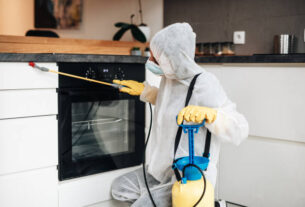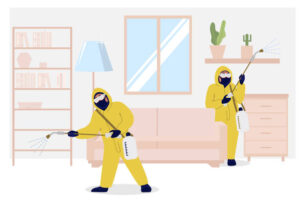When it comes to organising a small kitchen space, utilising the area under the sink for storage may seem like a practical solution. However, it’s crucial to understand that this space is not always suitable for all household items. In this article, we will explore the items that should never find their place beneath your kitchen sink. By avoiding these storage choices, you can ensure both the safety of your belongings and the efficiency of your kitchen setup.
Page Contents
Paper Products – Vulnerable to Moisture
Storing paper products under the sink may seem like a convenient choice, but it can lead to issues caused by moisture. The proximity to the plumbing pipes and the occasional splashes or leaks that can occur in the kitchen make this area prone to dampness. To ensure the effectiveness and longevity of paper-based items, it is important to find an alternative storage location that keeps them dry and intact.
Paper Towels – Absorbent and Prone to Damage
Paper towels are a staple in many households, providing quick and convenient clean-up solutions. However, when stored under the sink, they are exposed to the risk of moisture, which can compromise their absorbency and effectiveness. To maintain their quality, consider storing them in a kitchen cabinet or pantry. Allocate a dedicated space in a cabinet or pantry away from potential water sources. This will keep the paper towels dry and readily accessible for everyday use.
Trash Bags and Compost Bags – Preserve Their Functionality
Trash bags and compost bags made of paper are designed to biodegrade quickly when exposed to moisture. Storing them under the sink can render them less effective and prone to damage. To ensure they remain intact and capable of performing their intended function, consider storing them in a separate cabinet. Reserve a designated cabinet or storage area for paper-based bags. This will help prevent them from absorbing moisture, maintaining their structural integrity until needed.
Moisture-Resistant Alternatives – Enhance Longevity
If you find that your kitchen lacks suitable space for storing paper products away from moisture, consider exploring alternative options that are more resistant to damp conditions. Here are a few suggestions:
- Plastic or reusable cleaning cloths – Replace disposable paper towels with reusable cleaning cloths made of microfiber or other moisture-resistant materials. These can be easily washed and reused, reducing waste while offering superior absorbency.
- Plastic or biodegradable trash bags – Opt for plastic or biodegradable trash bags that are specifically designed to withstand moisture. These alternatives provide a reliable solution for waste management without compromising their functionality.
Small Kitchen Appliances – Keep Electronics Away from Water
While it may appear convenient to place small kitchen appliances, such as slow cookers or bread makers, under the kitchen sink, it is essential to consider the risk of water damage. Electronics and water are not a favourable combination. Opt for storing these appliances in a different space to ensure their longevity and safety.
Harsh Chemicals – Safeguarding Household Members
Many households store cleaning products under the kitchen sink, but this can pose a significant health hazard, especially if you have children or pets. Given its easy accessibility, the area under the sink is not an ideal place for harsh chemicals. To prevent accidents or ingestion, it is advisable to store these cleaners at higher locations, such as the bathroom, utility closet, or in a cabinet out of reach.
Flammable Products – Proper Ventilation is Key
Items labelled as “flammable” should never be stored in the kitchen, including under the sink. To ensure safety, it is best to store flammable products in well-ventilated spaces such as the garage or a dedicated storage area.
Insecticides – Safety Beyond Convenience
While it might be tempting to keep insecticides or rat poison under the kitchen sink for convenience, it is crucial to prioritise the safety of children and pets. Store these products on a high shelf in the garage or a designated storage room, far from their reach.
Pet Food – Separate Storage for Safety
When storing harmful chemicals beneath the sink, it is vital to keep pet food in a separate location to avoid potential cross-contamination. Unless securely sealed in a box or package, pet food can develop mould when exposed to moisture. Ensure the well-being of your pets by storing their food in a spot away from potential hazards.
Pantry Items – Protecting Dry Goods
Although it may seem logical to utilise every available space optimally, storing pantry items like cereal boxes, pasta, dried spices, potatoes, or onions under the kitchen sink is not advisable. Potatoes can smell rotten if stored beneath the kitchen sink, as the damp environment can encourage them to spoil and develop a pungent scent. Even without cleaning products nearby, the moist environment beneath the sink is not suitable for food storage, particularly dry goods that can deteriorate upon contact with water.
Fragile Objects – Prioritise Safety
Delicate items made of materials such as glass, like light bulbs, should be kept away from the area under the sink. Due to the frequent movement and potential spills that can occur in the kitchen, these fragile objects are at a higher risk of being damaged. In addition to the risk of breakage, shattered glass poses a safety hazard that should be avoided.
To safeguard both your belongings and your household members, store light bulbs in a location where the likelihood of accidental damage is minimised. By choosing a storage spot away from high-traffic areas and potential hazards, you can ensure the longevity of your fragile items and maintain a safe environment within your home.
Dishwasher Pods – Safety and Accessibility
While the area under the sink may seem like a convenient place to store dishwasher pods due to its proximity to the dishwasher, it is important to prioritise safety, especially when children or pets are present in the household. Dishwasher pods often come in colourful and appealing packaging, which can attract the curiosity of little ones or animals. Cleaning professionals advise you to prevent any accidental ingestion or exposure to harmful chemicals by finding an alternative storage location.
Consider relocating dishwasher pods to a laundry room or placing them on a high shelf that is out of reach. This way, you can ensure the well-being of your household members and mitigate any potential risks associated with the accessibility of these cleaning products. By making a small adjustment in your storage habits, you can create a safer environment while still maintaining the convenience of using dishwasher pods.
Final words
Understanding which items should not be stored under your kitchen sink helps you create a safer and more efficient storage system. Remember to avoid paper products, small kitchen appliances, harsh chemicals, flammable products, insecticides, pet food, pantry items, fragile objects, and dishwasher pods in this space. Implementing these guidelines will help you maintain a well-organised kitchen while prioritising the safety of your home and loved ones.

Lois Lane is a professional blogger and a seasoned Content writer for wellhousekeeping.com. With a passion for simplifying complex Home Decor topics, he provides valuable insights to a diverse online audience. With four years of experience, Lois has polished his skills as a professional blogger.




